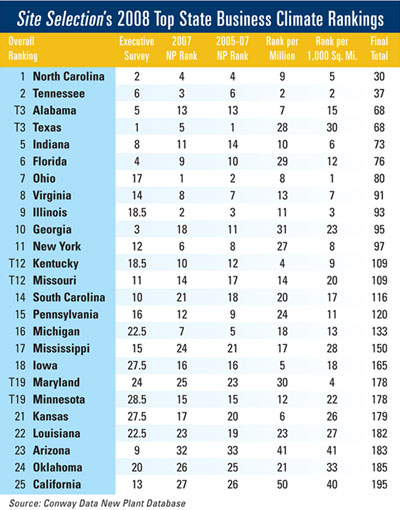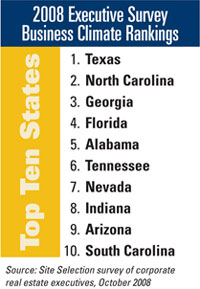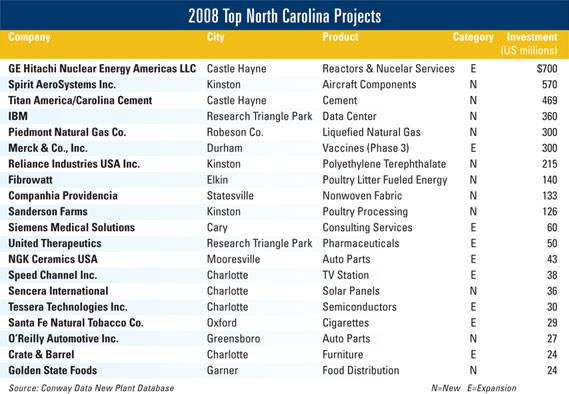
COVER STORY: 2008 BUSINESS CLIMATE
From Site Selection magazine, November 2008
Pedal
to the
Metal
to the
Metal

G
reat incentives. Low taxes. A receptive economic development department.
That's how one corporate site seeker described North Carolina in a survey of such respondents that makes up half of Site Selection's annual ranking of state business climates. Add a track record of consistently strong business expansion activity as tracked by the publication's proprietary New Plant database – the other half of the ranking – and a state has what it takes to land at the top of that ranking.
Which is exactly what North Carolina has done for the fourth year in a row, and for the seventh time in eight years.
"We had to be aggressive, because there's so much transition going on in the economy," says Gov. Mike Easley, who spoke with Site Selection the very week the recent financial crisis claimed one of its biggest victims – Charlotte-based Wachovia Bank, weakened by a distressed-debt-heavy loan portfolio.
Local and regional pundits in September and October wasted no time predicting a mass exodus from the Charlotte area's financial sector – a sector that had grown from obscurity in the 1980s to the sector that turned the metro into a national financial center over the past 25 years. Finance, it seemed, would go the way of North Carolina's textile, furniture and agriculture industries. But the governor has other plans.
Crisis or Opportunity?
Since 9/11, Wall Street firms have been required to operate redundant processing systems outside of New York, and such financial companies as Fidelity Investments and Credit Suisse chose the Research Triangle Park in the Raleigh-Durham area as the location for theirs.
"Those are different operations from what's in Charlotte, but this may be an opportunity for us to capitalize on our retail franchise, and the investment brokerage business as well," says Easley. "I just need to explain to those companies what a great opportunity it is to them, right?"
Tar Heel Tenacity
"There's a lot of short-term pain right now, but the long-term gain in diversity and knowledge-based jobs translates into a lot of job security and economic security for the state," says Gov. Easley. "The whole nation is going through this transition."
But only one state wins the top business climate ranking, and Easley has some ideas about why his state fares so well.
Overhauling the state's economic development Web site to deliver more information of interest to site seekers was one part of the strategy. If that site does not provide the information most needed by those involved in location research, "you can get eliminated from consideration by a project team and not even know that project is out there," says the governor.
Face-to-face meetings with corporate executives both in Raleigh and around the country also played a role, primarily in educating those executives about steps the state is taking to improve the business climate. Easley says he and his staff invited candid comments from attendees. "They were very frank and very honest. We encouraged it, and we used that criticism to our benefit."
The One North Carolina Fund, which can be used to lure key projects in target industries, is a result of those meetings. The Job Development Investment Grant (JDIG) came later. JDIG helps the state recruit talent into industry sectors being cultivated in the wake of dis-investment in legacy industry sectors.
More recently, the state has passed a measure to reimburse companies for work-force education through tax credits and to cancel the state sales tax on high-tech equipment costing $200 million or more.
"Those companies are creating world-class facilities in North Carolina, and they are investing in our people, our work force, to make sure they stay in the state, because we're the only ones who know how to work it," says Easley. "We still get a net benefit out of it in terms of revenues, but we've raised the level of productivity of those plants in North Carolina."
Education Investments Pay Off
A case in point is Spirit AeroSystems' selection of the North Carolina Global TransPark in Kinston as the site for a 500,000-sq.-ft. (46,450-sq.-m.) fuselage design and manufacturing complex (see the Aerospace Industry report on page 902). Jim Cocca, the company's director of facilities, told Senior Editor John McCurry that in-depth analysis of the Kinston area, in the eastern part of the state, indicated "a highly skilled, underemployed work force, much of it coming from the textile and furniture industries." What's more, composites developed in the textile industry will soon be applied to work done at Spirit AeroSystems, so not only is labor available, but it is exactly the right kind of labor.
Gov. Easley refers to the project as "transformational for eastern North Carolina. We never had to build an economy in eastern North Carolina, because we had tobacco," he says.

Education Investments Pay Off
To meet a $2.5-billion budget shortfall in 2001, Easley raised taxes, which made more funds available for community colleges and state universities. Early education, including pre-K programs, also benefited. The thinking was that investing substantially in education at the time would result in the work force the state would need in five or 10 years and beyond.
In 2004, Gov. Easley introduced a program called Learn and Earn that specifically addresses the need for high school students to acquire the skills required by employers in the new economy. The program gives students the option of a five-year high school program whereby they earn both a high school diploma and a community college associate degree.
"In essence, every high school is now a satellite college," says Easley.
“We are changing the delivery system of education so that college goes to the student if the student cannot go to the college. This effort will assure that our state has the best work force in the world and gives every child an opportunity to reach his or her full potential.”
"Learn and Earn will change North Carolina high schools so that students receive the skills and training they need for high-skilled, better-paying jobs," explained the governor when the program was launched in September 2004. "If students know they can graduate with practical job skills and an advanced degree, they will have an additional incentive to complete their degree before entering the work force."

Easley also noted that nearly all of the new projects the state recruits are looking for workers with at least an associate degree, and that it is the state's job to provide them.
Existing and potential employers' skill sets can be built into college curricula, and in some cases, corporate facilities serve as branches of community colleges, further integrating employers and future employees.
Exactly four years later, this past September, the Learn and Earn program received a 2008 Innovations in American Government Award from the Ash Institute for Democratic Governance and Innovation at Harvard University's Kennedy School of Government. Nearly 1,000 programs representing all levels of government competed in the awards program. As a winner, North Carolina will receive $100,000 for replication and dissemination of the program.
"North Carolina is the first and only state in America to offer a free college education to every student," noted Easley on Sept. 9. "We are changing the delivery system of education so that college goes to the student if the student cannot go to the college. This effort will assure that our state has the best work force in the world and gives every child an opportunity to reach his or her full potential."
“If students know they can graduate with practical job skills and an advanced degree, they will have an additional incentive to complete their degree before entering the work force.”
R&D and Biomanufacturing
Galexe Pharma Sciences announced in July that it will locate a pharmaceutical manufacturing plant in Lenoir, in Caldwell County, that will employ 55 workers. The company, a subsidiary of Virginia-based Exela PharmaSci Inc., will invest $8.6 million to occupy and remodel a vacant facility. Locations elsewhere in the U.S. and in Hyderabad, India, were also under consideration.
"The affordable cost of living, and the various grants and incentives added up to an overall lower cost of doing business," noted Phanesh Koneru, president and CEO. A $250,000 grant from the One North Carolina Fund and additional support from state and local agencies played a role in the location decision, but "availability of local talent, proximity to several equipment vendors and milder year-round weather are additional factors."
Anecdotally, that company's experience of siting in North Carolina makes the point the governor stresses, which is the importance of individual components of the business climate but also of the landscape as a whole.
"You've got to have the work force and the right education level of the work force, and with respect to incentives, you don't have to win every time, but you have to level the playing field," says Easley.
“The affordable cost of living, and the various grants and incentives added up to an overall lower cost of doing business”

Site Selection Online – The magazine of Corporate Real Estate Strategy and Area Economic Development.
©2008 Conway Data, Inc. All rights reserved. SiteNet data is from many sources and not warranted to be accurate or current.
©2008 Conway Data, Inc. All rights reserved. SiteNet data is from many sources and not warranted to be accurate or current.
